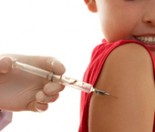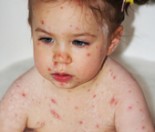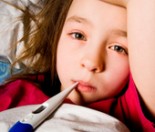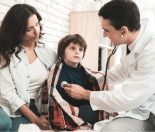We provide information and advice about Slap Cheek or Parvovirus in humans – the signs and symptoms, treatments, risks and complications.
What is Slap Cheek?
This viral illness gets its name from the characteristic `slap like’ rash that appears on children’s faces.
It is now more commonly known as Parvovirus (caused by parvovirus B19) which is different from the parvovirus that can be carried by cats and dogs.
Slap cheek is also called Fifth disease (because it was the fifth childhood infection with rash-like symptoms after measles, German measles, scarlet fever and roseola) and by its Latin name Erythema Infectiosum, which means infectious rash.
It is a relatively mild disease that begins with a rash on the face which spreads to the body and then fades. It often occurs in small outbreaks and will rapidly spread through schools and day care centres. The virus is spread by sneezing, coughing, kissing or close contact. Children are infectious for the 5 – 6 days before the rash appears.
Incubation time (the period from first being exposed to the illness until symptoms developing) is around 5 – 20 days. Once the rash appears, the child is no longer infectious. Once your child has recovered from slap cheek they should have lifelong immunity to the illness.
What are the signs and symptoms of slap cheek or parvovirus?
- The rash can be preceded by a fever, sore throat and cold symptoms
- A red rash on the face that may appear on one or both cheeks- it actually looks like the cheek has been slapped
- The rash on the body is firstly red and blotchy and then becomes faded and lace-like
- The rash may be itchy
- The rash may fade and then flare up, exacerbated by sunlight, exercise, temperature changes like a bath and the child getting upset
- The child is normally well, apart from the rash, but may have stomach upsets, headache and fatigue.
Slap cheek can also affect adults where it may present as joint pains (especially hands, wrists, ankles, knees) and swelling that may last from days to weeks. There will often be no rash in adults.
What is the treatment for Slap Cheek?
Contact your doctor if your child’s temperature is very high, or you are in the first half of a pregnancy or you are not sure if the rash is slap cheek.
There isn’t any treatment as such – you just need to keep your child comfortable; see ‘What can I do?’ below.
See your doctor if your child develops swollen, painful joints.
Risks and complications of Slap Cheek
It can seriously affect children and adults with immune deficiency disorders such as leukaemia, haemolytic anaemia and sickle cell anaemia and people receiving chemotherapy treatment.
In all these instances see the doctor promptly.
There is a potential risk for pregnant women. Around 50 – 70% of all pregnant women carry a natural immunity to parvovirus, but in those who are not immune it can cause miscarriage in the early stages of pregnancy (risk is 10-20%). Parvovirus can also cause circulation problems in the fetus. Child centres and schools need to alert pregnant mums when there is a local outbreak of parvovirus.
How to treat Slap Cheek at home
- Keep your child comfortable in cool cotton clothing
- Apply calamine lotion to the skin to relieve the itch
- Keep your child’s nails short to help prevent scratching and secondary infection
- Ensure your children wash their hands regularly throughout the day
- It may help to use cotton gloves, mittens or socks on smaller children or at night to stop scratching
- Ensure they have plenty to drink
- If your child has a fever, or is in discomfort, give paracetamol syrup, checking the bottle for correct dose for age
- If your child has developed slap cheek let any friends, relatives or social contacts who are pregnant know so they can inform their doctor or midwife, who will do blood tests and monitor the pregnancy
Now that you know more about Slap Cheek, you may want to arm yourself with more expert health advice, see our Common childhood illnesses section.







My son passed the virus to me, which caused me painful joints, and swelling body. I had rash for one day, one week later had red swelling cheeks for one day, now still have some swellings all over my body, and my weight is 3kg heavier. Also I had headache, a bit temperature, short breath, stomach upsets and fatigue.
Wow. I’m guessing you weren’t exposed to the virus as a child then. The symptoms sound pretty horrible, I hope you’re on the up and up again. — Jarrod
my friend informed me today that her son has slepcheek at the moment i saw him about 2 weeks ago and found out last week that i am pregnany. should i be worried? i think im around the 5week mark.
Hi Taylorsmum,
Most likely, you’ll be just fine, but there is a very slight chance of miscarriage in the first 20 weeks. There’s a good comment about this here: http://www.babycentre.co.uk/pregnancy/antenatalhealth/physicalhealth/slappedcheekexpert/
Hope it helps!
Rochelle
my son has slapcheek at the moment, could you please tell me how long will he have the rash for?, also is there a product i can use on his skin to wash him instead of soap which will be soothing and leave his skin feeling soft again? please help me, thank you.
Hi Sue,
Our Well Child nurse, Kate, offers the following advice:
Hi there the rash can come and go for a few weeks – often up to 3. The good news is though he is no longer contagious. As far as soaps are concerned, I would be inclined to not use any, however you can add oats (in a stocking) to the bath and this makes it sort of milky and can be soothing. Otherwise, if the rash is hot and red you can go to your GP to get some steroid creams. Good Luck.
Hope this help!
Rochelle